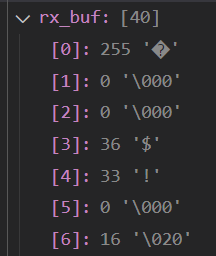Hi,
I have the following problem.
I have a custom board where I have BMI270 connected with SPI.
I use the nrfx_spim library.
I get error codes as a success when I try to write and read to SPI, however, I always get 0x00.
So I assume the problem has to be with the configuration of the hardware. The board is professionally made by a manufacturer, so the problem is not here, but rather in my configuration.
Here is my dts file part with the configuration for SPI, I tried using BMI270 predefined profile, and also manually, but none of them worked for me.
On my board connections are:
BMI270 SDO/MISO -> P0.20
BMI270 SDI/MOSI -> P0.22
BMI270 SCK -> P0.24
BMI270 CS -> P1.00
&gpio0 {
status = "okay";
};
&gpio1 {
status = "okay";
};
&spi1 {
status = "okay";
bmi270@0 {
compatible = "bosch,bmi270";
reg = <0>;
spi-max-frequency = <DT_FREQ_M(10)>;
};
pinctrl-0 = <&spi1_default>;
pinctrl-names = "default";
cs-gpios = <&gpio1 0 (GPIO_ACTIVE_LOW)>; // P1.00 as CS, active low
};
&pinctrl {
spi1_default: spi1_default {
group1 {
psels = <NRF_PSEL(SPIM_SCK, 0, 24)>,
<NRF_PSEL(SPIM_MOSI, 0, 22)>,
<NRF_PSEL(SPIM_MISO, 0, 20)>;
};
};
};
I also tried enabling and disabling those CONFIG flags
CONFIG_SPI=y CONFIG_BMI270=y
and finally my main.c looks like this
#include <zephyr/kernel.h>
#include "SEGGER_RTT.h"
#include "SEGGER_RTT_printf.c"
#include "nrfx_spim.h"
// SPI instance index. You can have multiple instances for different peripherals.
#define SPI_INSTANCE_ID 0
#define SPI_CS_PIN 32
// Create an SPI configuration structure
nrfx_spim_config_t spi_config = NRFX_SPIM_DEFAULT_CONFIG(
NRF_GPIO_PIN_MAP(0, 24), // SCK pin
NRF_GPIO_PIN_MAP(0, 22), // MOSI pin
NRF_GPIO_PIN_MAP(0, 20), // MISO pin
NRF_GPIO_PIN_MAP(1, 0) // CS pin
);
nrfx_spim_t spi_instance = NRFX_SPIM_INSTANCE(SPI_INSTANCE_ID);
void spi_write(uint8_t *data, size_t length) {
nrfx_spim_xfer_desc_t xfer_desc = NRFX_SPIM_XFER_TX(data, length);
nrfx_spim_xfer(&spi_instance, &xfer_desc, 0);
}
void spi_read(uint8_t *command, size_t command_length, uint8_t *response, size_t response_length) {
nrfx_spim_xfer_desc_t xfer_desc = NRFX_SPIM_XFER_TRX(command, command_length, response, response_length);
nrfx_spim_xfer(&spi_instance, &xfer_desc, 0);
}
static uint8_t bmi270_read_register(uint8_t reg_addr) {
// Assuming the sensor uses single-byte addresses
uint8_t tx_buf[] = {0x80 | 0x00, 0x00}; // 0x80 for read, followed by dummy byte
uint8_t rx_buf[2] = {0};
// Prepare transfer
nrfx_spim_xfer_desc_t xfer_desc_tx = NRFX_SPIM_XFER_TX(tx_buf, sizeof(tx_buf));
nrfx_spim_xfer_desc_t xfer_desc_rx = NRFX_SPIM_XFER_RX(rx_buf, sizeof(rx_buf));
// Transfer
nrfx_err_t err_code = nrfx_spim_xfer(&spi_instance, &xfer_desc_tx, 0);
if (err_code != NRFX_SUCCESS)
{
// Initialization failed
SEGGER_RTT_WriteString(0, "Sending failed!\n");
return -1;
}
else
{
SEGGER_RTT_WriteString(0, "Sending has been done successfully!\n");
}
k_sleep(K_MSEC(2000));
err_code = nrfx_spim_xfer(&spi_instance, &xfer_desc_rx, 0);
if (err_code != NRFX_SUCCESS)
{
// Initialization failed
SEGGER_RTT_WriteString(0, "Reading failed!\n");
return -1;
}
else
{
SEGGER_RTT_WriteString(0, "Reading has been done successfully!\n");
}
// The received data is in rx_buf[1]
return rx_buf[1];
}
int main(void)
{
nrfx_err_t err_code = nrfx_spim_init(&spi_instance, &spi_config, NULL, NULL);
if (err_code != NRFX_SUCCESS)
{
// Initialization failed
SEGGER_RTT_WriteString(0, "SPI init failed!\n");
return -1;
}
else
{
SEGGER_RTT_WriteString(0, "SPI init performed successfully!\n");
}
uint8_t data_buffer_from_SPI = bmi270_read_register(0x00);
//for(int i = 0; i < sizeof(data_buffer_from_SPI); i++)
//{
SEGGER_RTT_printf(0, "BMI270 data0: 0x%02X\n", data_buffer_from_SPI);
//}
}
Everything looks good when checking error codes.
More from my trial and error:
-it didn't work below 125kH as it is not supported, so I got this exception
-when I added the CONFIG_SENSOR=y flag it didn't want to build
I think that's what I have now, I am pretty sure I have a problem with hardware configuration, but I don't know where.
When I ran this application on the nRF52840 DK board, I got the same output, even though there are no SPI devices connected, but the write and read were fine just 0xFF as well.
Thank you for any help :D



